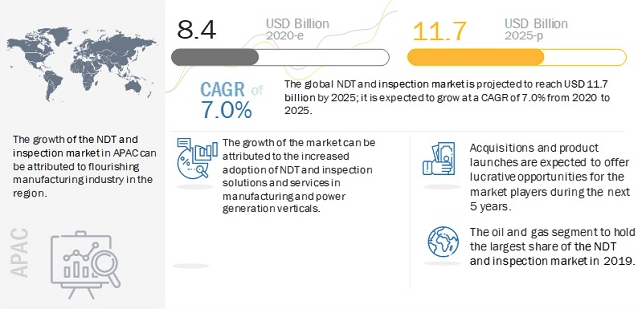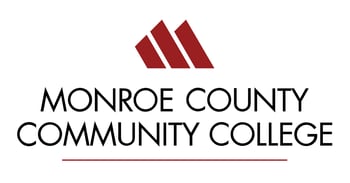Demand for Qualified Ndt Workers Outpacing Supply Continued in 2016
The Nondestructive Evaluation and Testing (NDE/NDT) field is an in-demand career option offering substantial room for advancement, diverse field applications, and great earning potential. The general scope of an education focused on NDE/NDT includes the study of techniques used to evaluate, test, or inspect materials and structures for defects or imperfections—anything that may affect the object's ability to serve its purpose—without damaging it. While NDT is commonly associated with the power and energy markets (i.e., inspecting boilers, piping, tanks, and turbines) other applications include flaw detection or identification of integrity problems in public infrastructure such as bridges or railway lines. For those interested in pursuing careers in NDE/NDT, the opportunity is vast. MarketsandMarkets estimates the global NDT and inspection market size is to grow from $8.4 billion in 2020 to nearly $12 billion by 2025. Market growth and retirement of existing technicians have resulted in workforce demand outpacing supply. Infographic from MarketsandMarkets On top of market expansion, advancing technologies, aging infrastructure and compliance to government regulations will further require an influx of educated, skilled inspectors. Though NDT educational programs are typically two years or less, starting salaries commonly range between $40,000 and $50,000. In 2019, the average U.S. nondestructive testing specialist made an average annual salary of nearly $63,000, according to the U.S. Bureau of Labor Statistics. Recognizing the demand for NDT professionals and rapid sector growth, more universities and technical colleges are integrating NDE/NDT into the existing curriculum, or offering specifically dedicated programs. The following are a roundup of some highly rated, specialized education options for the field of NDE/NDT (in no particular order). Highlighting its typically two-year NDT program as providing tremendous opportunities in safety and quality inspection, Cowley College offers an associate of applied science degree designed to enable NDT students to develop the knowledge and skills required to perform sophisticated testing techniques. Cowley's program can be taken online and includes, but is not limited to, blueprint reading, basic metallurgy, measurement, and proper use of equipment used in the various NDT testing processes. Students will be trained to set up and calibrate equipment, as well as interpret and evaluate results based on NDT methods with respect to applicable codes, standards and specifications, and ultimately be prepared for the American Society of Nondestructive Testing (ASNT) certification examination. Moraine Valley Community College offers an eight-course NDT certificate program that can be completed in one semester. Upon completion of ND8-112 Radiation Safety, students will be prepared to take the Radiographer Trainee Test administered by the Illinois Emergency Management Agency (IEMA). Those who complete the NDT courses will have fulfilled the training requirements for certification and will be prepared to accept an entry-level position in the NDT field. The American Institute of Nondestructive Testing's (AINDT) certificate program is aimed at equipping individuals with the skills required for a new career in NDT and has a job placement assistance program that coordinates with over 120 companies nationwide. The institute offers the convenience of online NDT training from any location, followed by 18 days of hands-on training at its Baxter, Minnesota, facility. AINDT notes that its program costs are the most affordable in the NDT training industry, and encourages prospective students to check out other NDT training programs for comparison. On top of affordability, AINDT boasts a 92% placement rate of its graduates. Iowa State University's Center for Nondestructive Evaluation (CNDE) was established in 1985 as a National Science Foundation Industry/University Cooperative Research Center. It offers NDE minors, as well as a 13-credit, course-based NDE graduate certificate (requires a bachelor's degree in engineering or a physical science). Though it currently doesn't offer master's or doctoral degrees in NDE, traditional engineering disciplines can choose to focus their thesis on NDE, working with professors within the ISU NDE research groups. With over 30 scientists and engineers, ISU describes its 52,000-square-foot CNDE facility as the premier U.S. research organization for the development and application of inspection and sensing technologies. Spartan College of Aeronautics and Technology offers a diploma in NDT Technology. Students learn how to operate equipment used in magnetic particle and liquid dye penetrant inspections while learning the basics of radiation safety, ultrasonics, metallurgy, eddy current, and leak detection. Students will also learn processing and interpreting film using x-ray equipment. Upon completion of this 10-month program, students have the option to apply to complete their degree in quality control management. In five additional months, students will learn to examine products and parts, determining if they are constructed/repaired in accordance with approved specifications and procedures. These students will earn an Associate's Degree in Applied Science. Boasting its two-year, at-your-own-pace NDT curriculum as "the gold standard for industrial inspection training," Ridgewater College's NDT program is "well-known throughout the country and within the industry as having the most extensive training and best-equipped, leading-edge NDT facility." Highlighted by the American Society for Nondestructive Testing in its Materials Evaluation publication, Ridgewater's NDT program was established in 1969. Skills learned include ultrasonic, phased array, radiography, eddy current, magnetic particle and more. The college currently reports a 97-100% job placement for its program graduates since 2010. Located in the energy capital of the world, The Ocean Corporation has offered hands-on programs in Commercial Diving and NDT since 1969. Programs are specifically designed to provide the knowledge to launch a new career, without the fluff of general education courses. OTC's programs take just 30 weeks to complete. Students pursuing NDT training will learn visual inspection, magnetic particle, dye penetrant, ultrasonics, eddy current and radiography. Student Services offers resume writing and interview preparation, all while ensuring graduates a seamless transition into working life. OTC emphasizes additional support and resources for Veterans and Active Military personnel. Great Bay Community College's two-semester NDT certificate program was launched in 2016, developed using the American Society for Nondestructive Testing and National Aerospace Standard to meet formal training requirements. Courses are all-encompassing, including instruction, demonstrations, and hands-on training of inspection methods commonly used in industries in southern and seacoast New Hampshire—ultrasonic testing, radiography, visual inspection, and liquid penetrant. During the program, students learn from and interact with a variety of NDT experts from different industries to increase perspective and networking opportunities. Requirements for certification as an NDT Technician include a specific number of classroom (formal) training for each inspection method, according to GBCC, as well as a specific number of hours of experience on the job. Students completing the program may continue to earn an associate degree in technical studies. Clover Park Technical College's NDT program provides many different options, including an eight-quarter NDT degree, UT certificates, eddy current and radiographic testing certificates and more. CPTC describes its program as preparation for graduates to become active and successful professionals in a wide range of NDT industries through hands-on technical training, which will include major NDT methods such as visual and optical, magnetic particle, liquid penetrant, radiographic, ultrasonic, and more, along with an overview of other methods. Students will also be introduced to advanced technologies such as ultrasonics, including phased arrays. Founded in Sheffield, United Kingdom, "Lavender International is a global brand for Non-destructive Testing (NDT) Training, Examination and Consultancy Services." Its training facility in Houston, TX features NDT courses, allowing students to earn certifications in PCN and SNT. Lavender NDT has been an Approved Training Organization since 2015. Courses include manual ultrasonics, phased array, eddy current, and HTHA detection and sizing. Lavender NDT's courses serve Levels I-III. Drexel's NDE curriculum is designed to fulfill Levels I & II NDE in theory and training requirements according to ASNT recommended practice. The goal of Drexel University's NDE lab—housed in a 5,000-square foot laboratory complex—is to introduce engineering technology (ET) students to methods and techniques of NDE of parts and materials, according to Drexel. At the lab, students learn the physical principles and fundamentals of ultrasound material characterization and industrial applications of NDE techniques and procedures. The NDE laboratory serves as a training center for undergraduate ET students, as well as for the workforce of companies such as Boeing, Lockheed Martin, and PECO Energy. Drexel highlights the establishment of a state-of-the-art laboratory for NDE as a facilitator of partnerships with the university to develop training options for technicians located in the region's key industries. A part of Monroe County Community College's Applied Science & Engineering Technology Division, the NDT program covers the basic concepts of five major NDT methods, including visual testing, UT, liquid penetrant testing, magnetic particle testing, and radiographic testing. Content is designed to provide general knowledge of NDT testing methods, as well as a thorough understanding of the necessity of NDT in real-world conditions. Classroom hours, grading criteria, and test composition are established in accordance with the ASNT recommended practices. Certificate offerings include basic and advanced, enabling students to pursue their desired level of expertise in the NDT field. MCCC describes graduates of its NDT program as being prepared for entry-level employment as an NDT technician, NDT evaluator, nuclear engineering technician, quality control technician or welding inspector. In conclusion, the demand for NDE/NDT technicians is rapidly growing. Concentrated curriculums are enabling the workforce to obtain quality education and training at an expedited pace with very high placement rates and quick returns on educational investments. Offering a vast range of field applications, professions in NDE/NDT are abundant and allow for career flexibility.


Cowley College: Arkansas City, Kansas
 Moraine Valley Community College: Palos Hills, Illinois
Moraine Valley Community College: Palos Hills, Illinois

American Institute of Nondestructive Testing: Baxter, Minnesota

Iowa State University: Ames, Iowa

Spartan College of Aeronautics and Technology: Tulsa, Oklahoma

Ridgewater College: Hutchinson, Minnesota

The Ocean Corporation: Houston, Texas
 Great Bay Community College: Rochester, New Hampshire
Great Bay Community College: Rochester, New Hampshire

Clover Park Technical College: Lakewood, Washington

Lavender NDT: Houston, Texas

Drexel University: Philadelphia, Pennsylvania

Monroe County Community College: Monroe, Michigan
Training the Next Generation of Technicians
Source: https://blog.geckorobotics.com/top-education-options-for-pursuing-nde/ndt-careers
0 Response to "Demand for Qualified Ndt Workers Outpacing Supply Continued in 2016"
Post a Comment